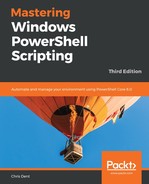Output from a specific stream may be directed by placing the stream number on the left of the redirect operator.
For example, the output written by Write-Warning can be directed to a file:
PS> function Test-Redirect{
>> 'This is standard out'
>> Write-Warning 'This is a warning'
>> }
PS> $stdOut = Test-Redirect 3> 'warnings.txt'
PS> Get-Content 'warnings.txt'
This is a warning
When using the redirect operator, any file of the same name is overwritten. If information must be added to a file, the operator becomes >>:
$i = 1
function Test-Redirect{
Write-Warning "Warning $i"
}
Test-Redirect 3> 'warnings.txt' # Overwrite
$i++
Test-Redirect 3>> 'warnings.txt' # Append
It is possible to redirect additional streams, for example, warnings and errors, by adding more redirect statements. The following example redirects the error and warning streams to separate files:
function Test-Redirect{
'This is standard out'
Write-Error 'This is an error'
Write-Warning 'This is a warning'
}
Test-Redirect 3> 'warnings.txt' 2> 'errors.txt'
The wildcard character * may be used to represent all streams if all content was to be sent to a single file:
$verbosePreference = 'continue'
function Test-Redirect {
'This is standard out'
Write-Information 'This is information'
Write-Host 'This is information as well'
Write-Error 'This is an error'
Write-Verbose 'This is verbose'
Write-Warning 'This is a warning'
}
Test-Redirect *> 'alloutput.txt'
The preceding example starts by setting the verbosePreference variable. Without this, or the addition of the verbose parameter to the Write-Verbose command, the output from Write-Verbose will not be shown at all.
